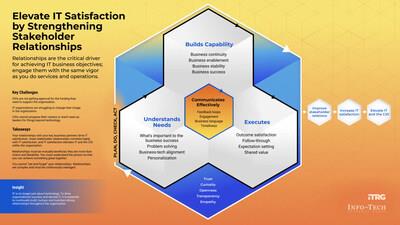Science
CIOs Advised to Enhance Stakeholder Engagement for Strategic Influence

According to a new report from the Info-Tech Research Group, Chief Information Officers (CIOs) are urged to prioritize stakeholder engagement to strengthen their influence and align IT initiatives with organizational goals. The research emphasizes that current stakeholder engagement efforts are often sporadic and primarily project-based, leading to a lack of sustained trust and influence critical for shaping strategic decisions.
The findings reveal that many IT leaders focus predominantly on technology delivery, mistakenly believing that operational improvements alone will enhance stakeholder satisfaction. Yet, the research indicates that the most significant gains arise from consistent, people-focused engagement. Elevating engagement practices from an occasional task to an ongoing priority can transform the IT role across organizations.
Redefining Stakeholder Engagement
Diana MacPherson, research director at Info-Tech Research Group, states, “Too many IT leaders still treat stakeholder engagement as a nice-to-have, when in reality it’s one of the most powerful levers for influence and satisfaction.” She emphasizes that when CIOs adopt a disciplined approach to relationship-building, they can earn the trust and alignment necessary to convert technology into lasting business value. “It’s people, not technology, who decide how IT is funded, influence your career progression, and help deliver on mandates and objectives,” MacPherson adds.
The traditional methods of stakeholder management often fall short because they are reactive and focused on individual projects. Info-Tech advocates for a disciplined, continuous improvement process that involves regular evaluation, reflection, and adjustment to remain relevant and trusted. “Technology is easy. People are hard,” explains MacPherson. By concentrating on relationships, IT leaders can directly connect technology initiatives to business priorities, leading to enhanced adoption and value realization.
A Four-Step Framework for Improvement
Info-Tech’s newly released resource, titled Elevate IT Satisfaction by Strengthening Stakeholder Relationships, outlines a practical four-step approach for IT leaders to transition from reactive stakeholder management to a more structured process. This framework encourages CIOs to adapt to the dynamic nature of relationships, ensuring ongoing relevance, trust, and alignment.
The first step involves identifying goals and stakeholders. The CIO and IT leadership team should collaborate with organizational executives, hidden influencers, and cross-functional partners to define clear engagement objectives. This proactive approach ensures that IT initiatives align with organizational priorities from the outset.
The second step focuses on understanding stakeholders. IT leaders should develop detailed profiles for each stakeholder, including their priorities, pressures, and preferred communication styles. This information allows for tailored conversations and effective execution of requests, ultimately building capabilities that matter most to the business.
Next, an action plan is created. The CIO’s core team translates stakeholder insights into targeted engagement plans with measurable objectives, success criteria, and timelines. Responsibilities are assigned, and regular progress reviews are crucial to maintain alignment.
Lastly, tracking progress and maintaining focus is essential. CIOs and IT leadership must monitor relationship health through regular reflections, pulse surveys, and targeted follow-ups. Addressing concerns quickly, reinforcing successes, and keeping relationships active—even as business conditions change—are vital for sustained engagement.
Building and maintaining strong stakeholder relationships requires consistent attention and a people-centric approach. Info-Tech stresses that these relationships form the foundation for trust, influence, and the ability to connect technology initiatives directly to business priorities. Over time, nurturing these connections can provide IT leaders with the credibility and access necessary to shape strategic outcomes.
MacPherson concludes, “In practice, strong stakeholder relationships empower IT leaders to position themselves as valued contributors to solving business challenges.” By leveraging this influence, CIOs can secure their place at early strategic planning sessions, ensuring that technology initiatives align with organizational goals from the outset.
For a comprehensive understanding and exclusive insights from Info-Tech’s experts, including Diana MacPherson, interested parties can access the complete Elevate IT Satisfaction by Strengthening Stakeholder Relationships blueprint by contacting [email protected]
About Info-Tech Research Group: Info-Tech Research Group is one of the world’s leading research and advisory firms, serving over 30,000 IT and HR professionals. The organization has been providing unbiased, relevant research and advisory services for nearly 30 years, helping leaders make strategic and informed decisions. For more information about Info-Tech’s divisions, visit McLean & Company for HR research and advisory services and SoftwareReviews for software buying insights.
-

 Science3 months ago
Science3 months agoToyoake City Proposes Daily Two-Hour Smartphone Use Limit
-

 Top Stories3 months ago
Top Stories3 months agoPedestrian Fatally Injured in Esquimalt Collision on August 14
-

 Health3 months ago
Health3 months agoB.C. Review Reveals Urgent Need for Rare-Disease Drug Reforms
-

 Technology3 months ago
Technology3 months agoDark Adventure Game “Bye Sweet Carole” Set for October Release
-

 World3 months ago
World3 months agoJimmy Lai’s Defense Challenges Charges Under National Security Law
-

 Lifestyle3 months ago
Lifestyle3 months agoVictoria’s Pop-Up Shop Shines Light on B.C.’s Wolf Cull
-

 Technology3 months ago
Technology3 months agoKonami Revives Iconic Metal Gear Solid Delta Ahead of Release
-

 Technology3 months ago
Technology3 months agoApple Expands Self-Service Repair Program to Canada
-

 Technology3 months ago
Technology3 months agoSnapmaker U1 Color 3D Printer Redefines Speed and Sustainability
-

 Technology3 months ago
Technology3 months agoAION Folding Knife: Redefining EDC Design with Premium Materials
-

 Business3 months ago
Business3 months agoGordon Murray Automotive Unveils S1 LM and Le Mans GTR at Monterey
-

 Technology3 months ago
Technology3 months agoSolve Today’s Wordle Challenge: Hints and Answer for August 19









